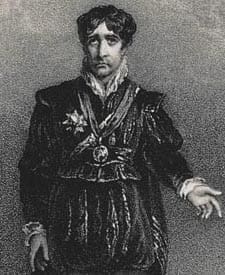- Skip to primary navigation
- Skip to secondary navigation
- Skip to main content
- Skip to primary sidebar
“Weeding” Shakespeare’s First Comedy
William Shakespeare didn’t live to see his very first comedy, The Two Gentlemen of Verona, performed on stage.
Scholars agree that the play was written in the early 1590s but did not receive its first full stage production until December 22, 1763 – nearly 150 years after Shakespeare died. Two Gents was published in the 1623 First Folio and, as with most of Shakespeare’s plays, he borrowed and adapted from a range of sources when writing this very early comedy (including Jorge de Montemayor’s Diana Enamorada, published in 1542, the story of Titus and Gisippus, found in Boccaccio’s Decameron written in 1353, and Arthur Brooke’s The Tragical History of Romeus and Juliet from which Shakespeare took the idea of using a rope ladder to get access to a balcony).
Why did it take so long for Two Gents to make it to the stage? Scholars differ, but the general consensus is this: The Two Gentlemen of Verona is, simply put, not a very good play.
In fact, the poor quality of the script had led a number of critics to suspect that Shakespeare was not the author of the play at all. William Rolfe, in his 1905 collection of essays about the play writes, “[a number of] 17th Century literary critics, believed the style of the play so little like Shakespeare’s general dramatic manner that they were confident ‘he could have had no other hand in it than enlivening, with some speeches and lines thrown in here and there,’ the production of some inferior dramatist from whose thoughts his own are easily to be distinguished.”
It wasn’t until David Garrick, the manager of the Drury Lane Theatre, commissioned his Irish friend and theatre manager Benjamin Victor to adapt the script that any of Shakespeare’s Two Gents saw the light of day…and even then, the script that was performed in 1763 wasn’t completely Shakespeare’s either. Victor writes, in his preface to his adaptation of The Two Gentlemen of Verona,
“It is the general opinion that this comedy abounds with weeds; and there is no one, I think, will deny, who peruses it with attention, that it is adorned with several poetical flowers, such as the hand of a Shakespeare alone could raise. The rankest of those weeds I have endeavored to remove; but was not a little solicitous lest I should go too far, and, while I fancied myself grubbing up a weed, should heedlessly cut the threads of a flower.”
What did Garrick, Victor and (later) other adapters find so problematic about The Two Gentlemen of Verona? Simon Godwin, who directed the play at Stratford in 2004, answers that question in his director’s notes, writing, “Its reputation is not good. It’s one of Shakespeare’s novice plays, perhaps his first, and certainly his earliest comedy. And it shows all the signs of being a play by an inexperienced writer. For example, the dialogue in the play is usually shared out between two or at most three characters – a sign that Shakespeare had yet to develop the confidence to sustain conversation across larger groups….There’s also directness in the plotting. As playwrights get more experienced, they become oblique in their exposition. Here, characters come on and say ‘the following things have happened so we must do this immediately’… This play is joyfully clear but sometimes you notice the joints.”
But, even so, there is something about the play that is…well…charming. Delightful. Joyful, even. William Hazlitt, one of my favorite Shakespearean scholars and critics, wrote in 1817, that “The Two Gentlemen of Verona is little more than the first outlines of a comedy, loosely sketched in….yet there are passages of high poetical spirit, and of inimitable quaintness of humor…there is throughout a careless grace and felicity….a sweetness of sentiment and expression. There is something pretty and playful about The Two Gentlemen of Verona.”
It has, in short, a certain “something.” Although it has a number of serious structural problems, it is also full of innocence, passion, sweetness, and earnestness. It is remarkable to me to read the play and see, in the characters and the verse, the young Shakespeare learning his craft in much the same way that these youthful characters are learning how to make their way in the world. For that alone, The Two Gentlemen of Verona is a noteworthy play.

The script we are performing is an amalgamation of Shakespeare’s original combined with Victor’s “weeded” adaptation, and also includes a number of rewrites from John Phillip Kemble (who adapted the script again for Drury Lane in 1790 and also happened to cast his wife in the role of Julia and who would later cast himself in the role of Valentine!).
Like Victor, Kemble, Macready, Kean and many, many others, our adaptation seeks to “weed” out some of the structural problems inherent in Shakespeare’s original while trying to retain the beautiful and very moving poetry that are hallmarks of Shakespeare’s greatest works. Perhaps most important to this adaptation, and to the others I’ve referenced, is the desire to help frame the play in a way that lets the innocence, joy and youthful energy of the characters (and their passionate poetry about love) take center stage.
Working with the design team, and the remarkable musician Beth Willis, we arrived at the idea of setting the play in the 1970s. As Melissa Heller said to me (and I’m paraphrasing), “the 70s were a time when youth was celebrated, where free love and following your passion were expected of young people, and when bad decisions were easy to forgive because basically everyone was stoned.” And, although we are not going quite that far with our rehearsal preparation, I agree. The 70s were marked by the creation of a counter-culture that celebrated freedom and free love, that embraced a growing movement for sexual liberation for women, that embraced a more bohemian lifestyle, that encouraged experimentation, and ultimately laid the groundwork for a number of social movements that would not truly flourish until many years later….not unlike the place that The Two Gentlemen of Verona holds in the trajectory of Shakespeare’s legacy.
In the 70s, we can see how our culture began to struggle with truly important issues (sexuality, love, the nature of relationships, the structures of power) that would not be fully explored until many, many years later. In Two Gents we can see Shakespeare struggle with the same kinds of themes that would not be fully realized until his much later works.
And, one of the best reasons to set the play in the 1970s? Because it’s hilarious.
Our production of The Six Gentlepersons Of Verona is our second all-female Shakespeare production and I am very proud that Bag&Baggage has a commitment to gender equity in this way. In fact, every single person working on this show (other than me) is a woman. Our entire design team, our production team, our cast, and of course our staff, are all women. In a time when debates about gender parity and equity are taking center stage in national discussions about theatre (female playwrights, directors, designers, staff leaders, artistic directors, etc), I feel very proud that Bag&Baggage is ahead of the curve; not only celebrating the enormous contributions of women artists as performers in our shows, but creating new opportunities for women artists to explore scripts, characters, and stories that have, for many hundreds of years, been denied them due to their gender.
I look forward to welcoming you to the wild, wonderful world of The Six Gentlepersons of Verona! Special thanks to the Cultural Coalition of Washington County for their generous support of this production!
 Scott Palmer
Scott Palmer
Adapter and Director


Reader Interactions